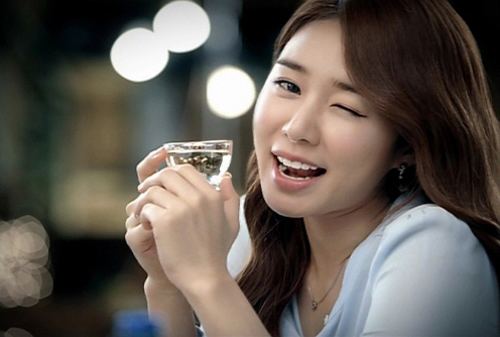
When customers visit
Ippuku (where I work) and see the shochu collection, they invariably say, "Oh wow, look at the beautiful sake collection!" I'm tired of correcting them, but I have to, and I tell them that those bottles are not sake, they are shochu! And then, they think for a minute and say, "Oh, soju!".
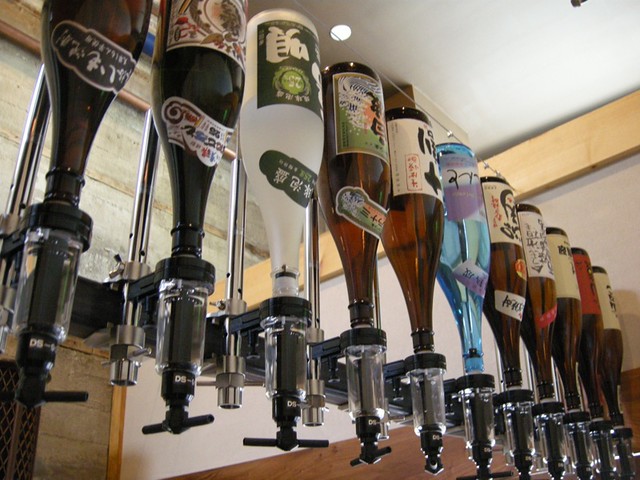
It's so annoying. Ippuku is a Japanese restaurant, why would we have Korean soju? Many American people know Korean soju, but nobody knows about Japanese shochu.
Basically, soju and shochu are the same distilled drinks, but there are a little differences. Let me talk about this today. But actually I don't know much about Korean soju, so let me check Wiki:
Soju is a distilled beverage native to Korea. Its taste is comparable to vodka, though often slightly sweeter due to sugars added in the manufacturing process, and more commonly consumed neat. Most brands of soju are made in South Korea. Though it is traditionally made from rice, most modern producers of soju use supplements or even replace rice with other starches, such as potatoes, wheat, barley, sweet potatoes, or tapioca. Soju is clear in colour and typically varies in alcohol content from about 18.5% to about 45% alcohol by volume (ABV), with 20% ABV being most common.
Yeah, it's true--soju is very similar to shochu. Now, let me tell you about shochu in detail. Basically, shochu is divided into two categories as 甲類 (
kou-rui) and 乙類 (
otsu-rui).
Kou-rui is distilled multiple times and often used in cocktails with various mixers such as tea and juice. Due to the less characteristic nature of
kou-rui it works well with sugary mixers.
Otsu-rui is a category for single distilled shochus. Within this category is the
honkaku sub-category. H
onkaku is considered to be premium shochu, mainly because during distillation, nothing can be added besides water and the grain. Absolutely no sugar, unlike soju. In this column, I'll only be talking about
honkaku shochus.
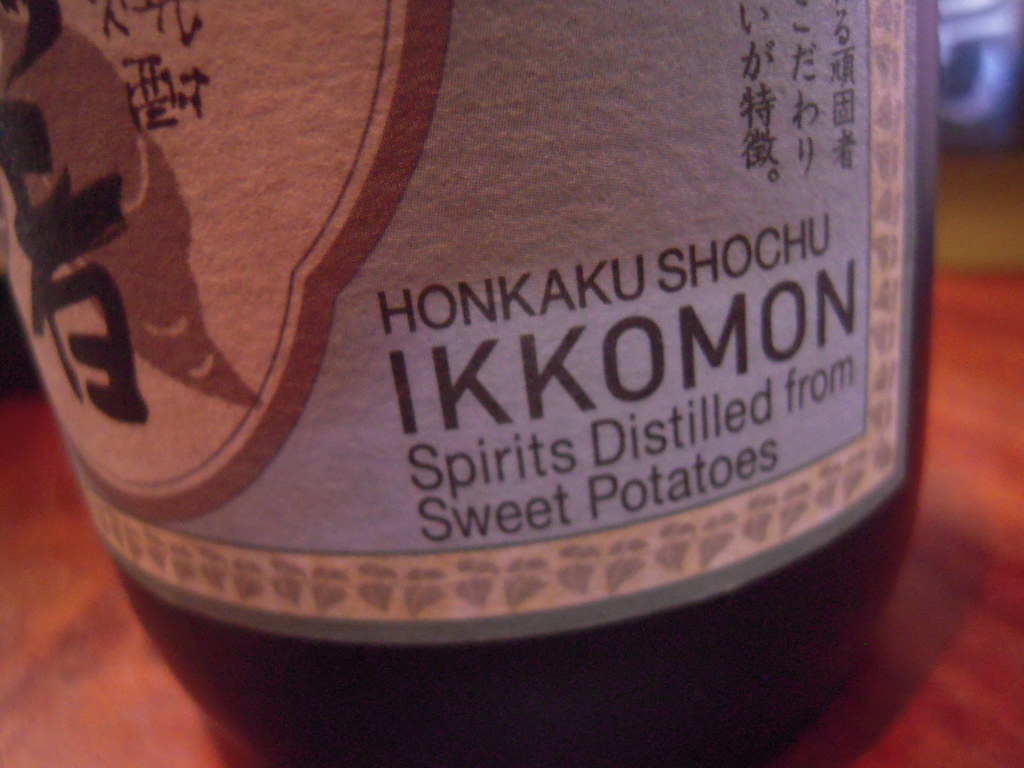
Why is shochu confused with soju? I think because of the words origin from same Chinese word. I have to quote Wiki again...
The word soju is the Korean rendering of the Chinese 燒酒 (pinyin: shaojiu), which literally means "burned liquor". (Incidentally, the Dutch-derived English word brandy—literally "burned wine"—uses the same linguistic concept to describe a distilled alcoholic beverage.) The Chinese word shaojiu is rendered in Japanese as shochu, the word that denotes a distilled alcoholic beverage that is the Japanese variant of soju.
And I must confess that Ippuku carry many sojus! Actually, we are selling soju as shochu! But we don't cheat customers and have some excuse. See Wiki again and again:
The liquor licensing laws in the states of California and New York specifically exempt the sale of soju from regulation relating to the sale of other distilled spirits, allowing businesses with a beer/wine license to sell it without requiring the more expensive license required for other distilled spirits. The only stipulation is that the soju must be clearly labeled as such and contain less than 25% alcohol. Another consequence is that the manufacturers of similar distilled spirits from other parts of Asia, such as Japanese shochu, have begun to relabel their products as soju for sale in those regions.
Most shochus' ABV is 25%, so Japanese distributors would need a hard liquor license, but if shochu's ABV is 24% and under, they can export it. That's why many distillers now decrease the ABV from 25% to 24% and export shochu as "soju" to the U.S.!!!
Look at this photo:
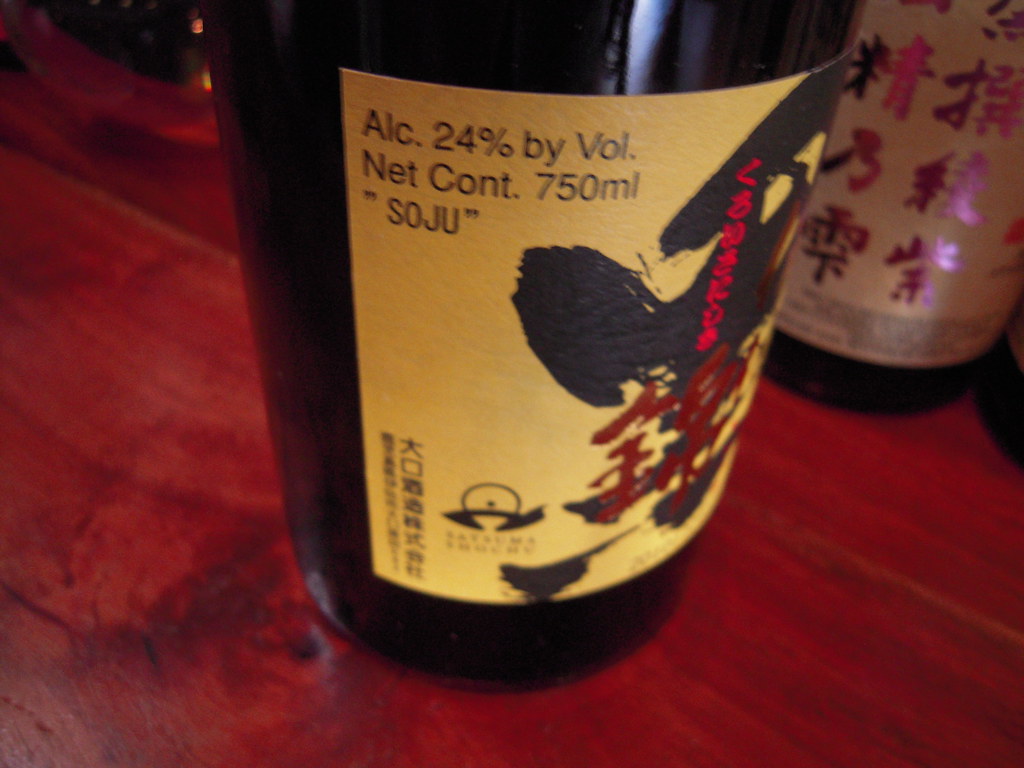 This is supposed to be shochu, but it is "SOJU".
This is supposed to be shochu, but it is "SOJU".
And this too...
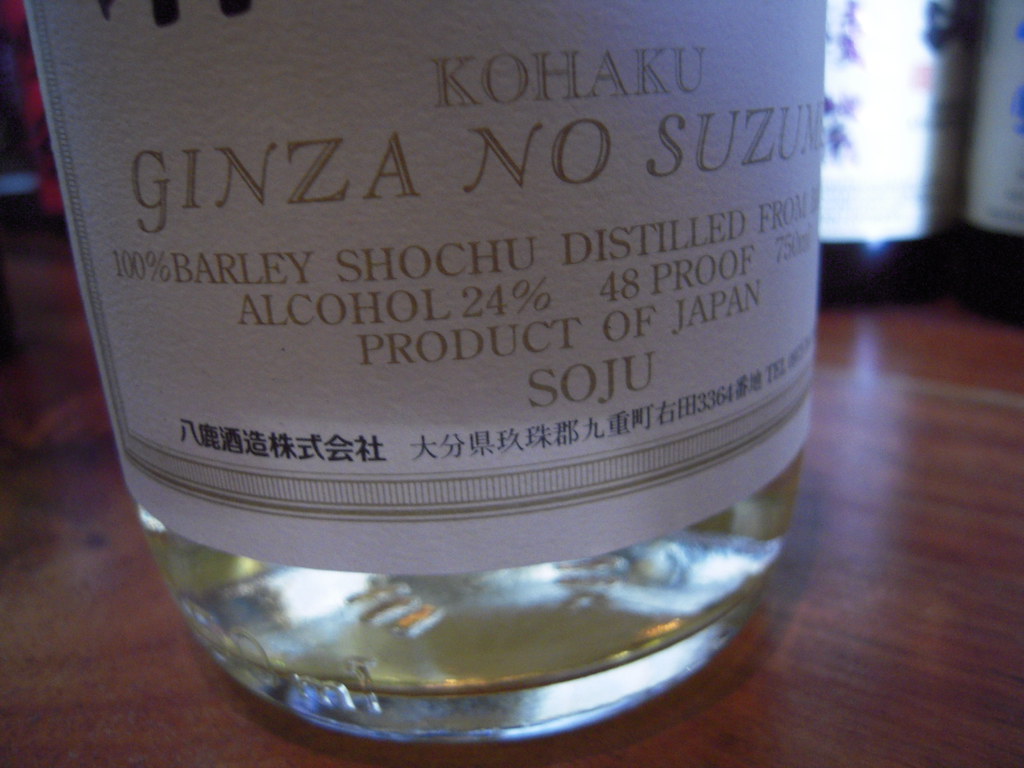
It's shameful. I have lost my Japanese pride.
Shochu is a hard liquor, but soju is not. If you want to sell shochu, hard liquor license is necessary, but soju doesn't require it. Hard liquor license is expensive, so it's easy to sell shochu as soju. To make sure, Ippuku has hard liquor license, of course.
OK, let's compare soju vs. shochu ads. First, most soju ads are like this.
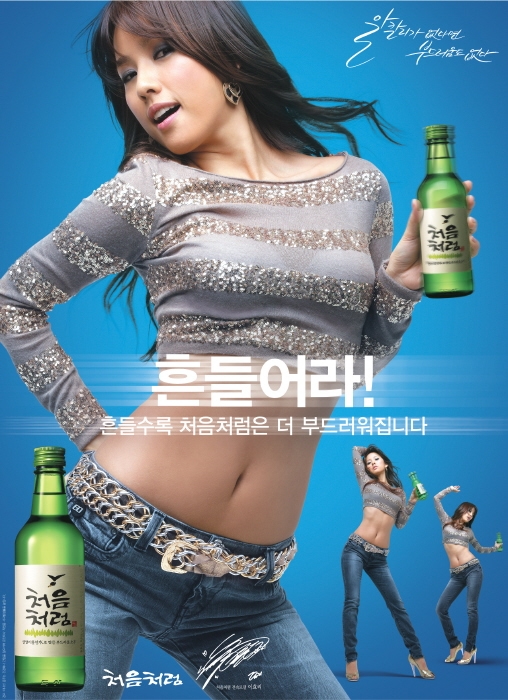
Fresh! Pretty!! Sexy!!! I wanna drink with her so bad. And how about shochu's?
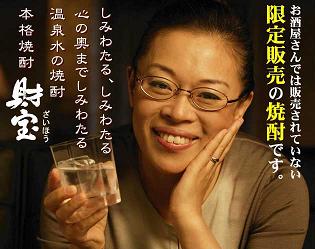
Cozy!!!
Maybe I'll start a new column "Soju Stop", starting next time.
Soju doesn't cheat you. Soju always stands by you (with pretty girls). Take your soju time.
I wanna take my soju time now...
 When customers visit Ippuku (where I work) and see the shochu collection, they invariably say, "Oh wow, look at the beautiful sake collection!" I'm tired of correcting them, but I have to, and I tell them that those bottles are not sake, they are shochu! And then, they think for a minute and say, "Oh, soju!".
When customers visit Ippuku (where I work) and see the shochu collection, they invariably say, "Oh wow, look at the beautiful sake collection!" I'm tired of correcting them, but I have to, and I tell them that those bottles are not sake, they are shochu! And then, they think for a minute and say, "Oh, soju!".
 It's so annoying. Ippuku is a Japanese restaurant, why would we have Korean soju? Many American people know Korean soju, but nobody knows about Japanese shochu.
Basically, soju and shochu are the same distilled drinks, but there are a little differences. Let me talk about this today. But actually I don't know much about Korean soju, so let me check Wiki:
Soju is a distilled beverage native to Korea. Its taste is comparable to vodka, though often slightly sweeter due to sugars added in the manufacturing process, and more commonly consumed neat. Most brands of soju are made in South Korea. Though it is traditionally made from rice, most modern producers of soju use supplements or even replace rice with other starches, such as potatoes, wheat, barley, sweet potatoes, or tapioca. Soju is clear in colour and typically varies in alcohol content from about 18.5% to about 45% alcohol by volume (ABV), with 20% ABV being most common.
Yeah, it's true--soju is very similar to shochu. Now, let me tell you about shochu in detail. Basically, shochu is divided into two categories as 甲類 (kou-rui) and 乙類 (otsu-rui). Kou-rui is distilled multiple times and often used in cocktails with various mixers such as tea and juice. Due to the less characteristic nature of kou-rui it works well with sugary mixers.
Otsu-rui is a category for single distilled shochus. Within this category is the honkaku sub-category. Honkaku is considered to be premium shochu, mainly because during distillation, nothing can be added besides water and the grain. Absolutely no sugar, unlike soju. In this column, I'll only be talking about honkaku shochus.
It's so annoying. Ippuku is a Japanese restaurant, why would we have Korean soju? Many American people know Korean soju, but nobody knows about Japanese shochu.
Basically, soju and shochu are the same distilled drinks, but there are a little differences. Let me talk about this today. But actually I don't know much about Korean soju, so let me check Wiki:
Soju is a distilled beverage native to Korea. Its taste is comparable to vodka, though often slightly sweeter due to sugars added in the manufacturing process, and more commonly consumed neat. Most brands of soju are made in South Korea. Though it is traditionally made from rice, most modern producers of soju use supplements or even replace rice with other starches, such as potatoes, wheat, barley, sweet potatoes, or tapioca. Soju is clear in colour and typically varies in alcohol content from about 18.5% to about 45% alcohol by volume (ABV), with 20% ABV being most common.
Yeah, it's true--soju is very similar to shochu. Now, let me tell you about shochu in detail. Basically, shochu is divided into two categories as 甲類 (kou-rui) and 乙類 (otsu-rui). Kou-rui is distilled multiple times and often used in cocktails with various mixers such as tea and juice. Due to the less characteristic nature of kou-rui it works well with sugary mixers.
Otsu-rui is a category for single distilled shochus. Within this category is the honkaku sub-category. Honkaku is considered to be premium shochu, mainly because during distillation, nothing can be added besides water and the grain. Absolutely no sugar, unlike soju. In this column, I'll only be talking about honkaku shochus.
 Why is shochu confused with soju? I think because of the words origin from same Chinese word. I have to quote Wiki again...
The word soju is the Korean rendering of the Chinese 燒酒 (pinyin: shaojiu), which literally means "burned liquor". (Incidentally, the Dutch-derived English word brandy—literally "burned wine"—uses the same linguistic concept to describe a distilled alcoholic beverage.) The Chinese word shaojiu is rendered in Japanese as shochu, the word that denotes a distilled alcoholic beverage that is the Japanese variant of soju.
And I must confess that Ippuku carry many sojus! Actually, we are selling soju as shochu! But we don't cheat customers and have some excuse. See Wiki again and again:
The liquor licensing laws in the states of California and New York specifically exempt the sale of soju from regulation relating to the sale of other distilled spirits, allowing businesses with a beer/wine license to sell it without requiring the more expensive license required for other distilled spirits. The only stipulation is that the soju must be clearly labeled as such and contain less than 25% alcohol. Another consequence is that the manufacturers of similar distilled spirits from other parts of Asia, such as Japanese shochu, have begun to relabel their products as soju for sale in those regions.
Most shochus' ABV is 25%, so Japanese distributors would need a hard liquor license, but if shochu's ABV is 24% and under, they can export it. That's why many distillers now decrease the ABV from 25% to 24% and export shochu as "soju" to the U.S.!!!
Look at this photo:
Why is shochu confused with soju? I think because of the words origin from same Chinese word. I have to quote Wiki again...
The word soju is the Korean rendering of the Chinese 燒酒 (pinyin: shaojiu), which literally means "burned liquor". (Incidentally, the Dutch-derived English word brandy—literally "burned wine"—uses the same linguistic concept to describe a distilled alcoholic beverage.) The Chinese word shaojiu is rendered in Japanese as shochu, the word that denotes a distilled alcoholic beverage that is the Japanese variant of soju.
And I must confess that Ippuku carry many sojus! Actually, we are selling soju as shochu! But we don't cheat customers and have some excuse. See Wiki again and again:
The liquor licensing laws in the states of California and New York specifically exempt the sale of soju from regulation relating to the sale of other distilled spirits, allowing businesses with a beer/wine license to sell it without requiring the more expensive license required for other distilled spirits. The only stipulation is that the soju must be clearly labeled as such and contain less than 25% alcohol. Another consequence is that the manufacturers of similar distilled spirits from other parts of Asia, such as Japanese shochu, have begun to relabel their products as soju for sale in those regions.
Most shochus' ABV is 25%, so Japanese distributors would need a hard liquor license, but if shochu's ABV is 24% and under, they can export it. That's why many distillers now decrease the ABV from 25% to 24% and export shochu as "soju" to the U.S.!!!
Look at this photo:
 This is supposed to be shochu, but it is "SOJU".
And this too...
This is supposed to be shochu, but it is "SOJU".
And this too...
 It's shameful. I have lost my Japanese pride.
Shochu is a hard liquor, but soju is not. If you want to sell shochu, hard liquor license is necessary, but soju doesn't require it. Hard liquor license is expensive, so it's easy to sell shochu as soju. To make sure, Ippuku has hard liquor license, of course.
OK, let's compare soju vs. shochu ads. First, most soju ads are like this.
It's shameful. I have lost my Japanese pride.
Shochu is a hard liquor, but soju is not. If you want to sell shochu, hard liquor license is necessary, but soju doesn't require it. Hard liquor license is expensive, so it's easy to sell shochu as soju. To make sure, Ippuku has hard liquor license, of course.
OK, let's compare soju vs. shochu ads. First, most soju ads are like this.
 Fresh! Pretty!! Sexy!!! I wanna drink with her so bad. And how about shochu's?
Fresh! Pretty!! Sexy!!! I wanna drink with her so bad. And how about shochu's?
 Cozy!!!
Maybe I'll start a new column "Soju Stop", starting next time.
Soju doesn't cheat you. Soju always stands by you (with pretty girls). Take your soju time.
I wanna take my soju time now...
Cozy!!!
Maybe I'll start a new column "Soju Stop", starting next time.
Soju doesn't cheat you. Soju always stands by you (with pretty girls). Take your soju time.
I wanna take my soju time now...



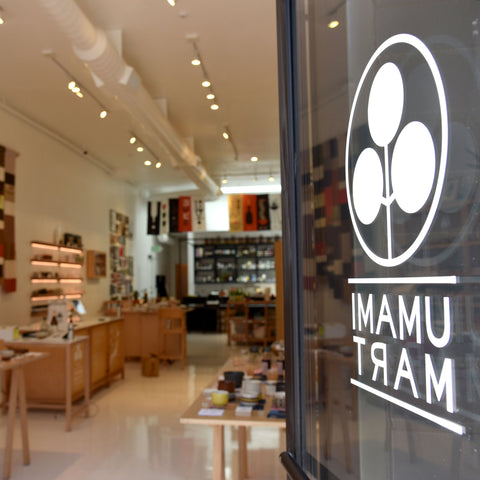
Comments (23)
“Ippuku is a Japanese restaurant, why would we have Korean soju?”
Canadian restaurants have spaghetti. American restaurants have tacos. Mexican restaurants have tacos al pastor. British restaurants have chicken korma. I may have even seen Coke in a Japanese restaurant or two. But Coke’s American. So annoying.
Empire and colonialism die hard, don’t they?
I think you need a Korean blogger at Umamimart. Then you can have sochu vs soju posts, as well as miso vs doenjang, chicken karaage vs tong dak, etc.
Interesting. I’ve never tried soju, even though I always go to Korean restaurants. Actually this week I had some jasmine shochu and kumquat (kinkan) shochu at this bar called…er, Shochu in London. The jasmine one was really niced and was mixed with cold jasmine tea. The kinkan one was a bit too perfume-y. But I’m more aware of shochu now I’m reading your column!
Damn alcohol license! This country is all about laws and regulations, and many manufactures find loopholes to get away with. Speaking of Korean drinks, I love good Maccoli, which is soo hard to find.
@Yamahomo Maccoli! wow I have not heard that from a non-Korean… quite possibly ever!
The reason why soju ads are sexier is because us Koreans can drink more than the Japanese thus leading to more one night stands. We are considered the Irish of the East. Now I’m gonna go put on a mini skirt and hit up all the Korean restaurants on Telegraph Ave..and loiter at Koreana Plaza while I’m at it.
Vivian, I drank maccoli like juice when I was in Japan last time. There’s one Korean grocery store in Flashing where you can buy it, but other than that location, I’ve never seen it in New York. Maccoli flavors are CRAZY, but I like Nama Maccoli the best.
Miss H – That’s true. That would be interesting.
Sakura – I haven’t heard about jasmine shochu and kumquat shochu. Are those cocktails? Or distilled from jasmine and kumquat?
Yamahomo – I love Maccoli too. It’s too bad you can’t find Maccoli in NYC, and I can’t believe it! Around this area I live, there are some Korean market, so we can get it.
Charmmie – Wao! Hmmm.
i’m suprised you can’t find more maccoli at korean restaurants in NYC. lately it has made a huge splash both in korea and here in LA. koreans have finally figured out how to bottle it and sell it commercially;it’s really more of a drink you made at home… if you were a farmer. the only downside i find is that some brands of maccoli tastes like weird sprite.
Very well written! Maybe you should have a soju vs. shochu blind tasting event to show the difference.